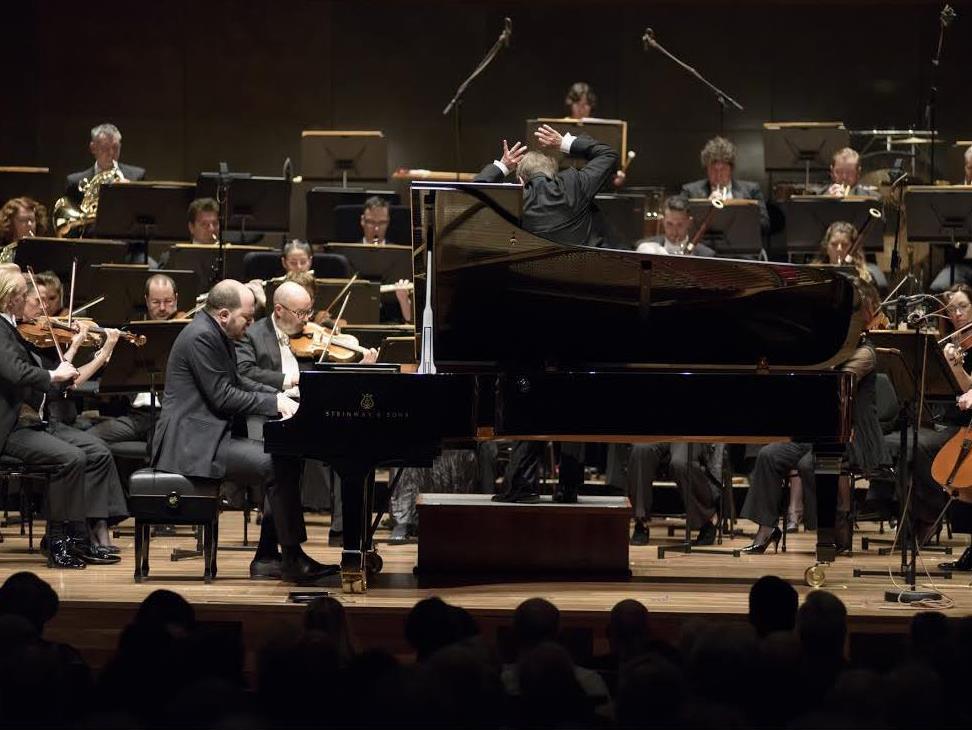Photo by Daniel Aulsebrook
Opposing views may divide countries but, as The Village People said, you ‘can’t stop the music.’ At Hamer Hall, last Thursday night, this was clearly evident in the diverse Rachmaninov’s Third concert which delivered music composed by Russian and East German men more than 150 years ago. The works were all composed for different reasons yet with equal passion.
Rimsky-Korsokov, the youngest of the three, was so moved by the plight of serfs in the Russian Revolution of 1905 that he joined their marches to a folk song, Dubinushka. Meaning “little oak stick,” the title represented the only weapon the serfs had against oppression. To immortalize the period Korsokov decided to orchestrate the poem, providing a mesmerizing effect of massed violin and cello bows in perfect unison. You could almost see the serfs marching with Korsakov conducting alongside. The precision and synchronicity of the Melbourne Symphony Orchestra is clearly one of the main reasons for its well-deserved international acclaim.
Then, the top of the black grand piano was opened and Sir Andrew Davis, the MSO’s esteemed Chief Conductor, born one exactly one hundred years after Rimsky-Korsokov, returned to the podium with Kirill Gerstein, the Russian-American pianist, born in 1979, just 106 years after Rachmaninov. If the great master had been watching in the wings, he would have been proud of the skill and dexterity with which Gerstein executed his extremely difficult work. Many people will remember the movie, Shine and the Rach 3 taking the measure of a young David Helfgott, giving the concerto a challenging reputation. Gerstein himself said the piece could turn the piano into an ‘all-consuming monster that’s about to devour you.’ On this evening, however, there was no question as to who was the master. If you confuse Rachmaninov’s Piano Concerto No. 2 with the Rach 3, as soon as the piece begins, the first eight notes of sheer genius will remind you. You may have forgotten the rest of the work but those eight notes remain to taunt you as the orchestra subtly brings them back, again and again, through the solo Piccolos, the violas, sweet violins and the ascending/descending crescendos on the piano that leave you breathless.
Gerstein has won many awards since he moved from Russia to New York to study at the Berklee College of Music. Now teaching in Germany, the acceleration of his worldwide recognition at the age of 36, has one significant component that he shares with many contemporary composers today, like Oliver Knussen, Chick Corea, Brad Mehldau, Timothy Andres and Alexander Goehr. Gerstein had an early appreciation of jazz and continued studying jazz along with classical music Melbourne has been exposed to many great jazz performers and composers yet there are people who still have difficulty appreciating the relationship of cool or modern jazz music to classical. The loose freedom of Gerstein/s hands brought the connection to the fore in a way that will continue to make his playing of the Rach 3 unique in music history.
In response to the thunderous applause, he then played an encore which will encourage all right-handed people never to give up the desire to play the piano – it just takes practice on L’Étude for the Left Hand Only: Op 36 by Felix Blumenfeld, a Russian contemporary of the next composer, German born, Richard Strauss, born 1864.
Strauss, originally a horn player, has presented an heroic tone poem, Ein Heldenleben, ‘The Hero, ’ in six parts and generally perceived as autobiographical. In true mythical style, he has used the complete orchestra, including eight horns, to introduce his hero as an strong warrior figure who then conquers his adversaries (with excellent use of the woodwind section.) At this point credit must be given to the woman at the back of the orchestra surrounded by kettle drums in the Timpani section and expertly in control of them.
This work was a kaleidoscope of talents, individual and grouped, with the composer giving full rein to them all as they complimented the story with playfulness and individuality, from the three piccolos to the spirited cellos and a very present tuba.
Particularly beautiful was the middle section where the solo Principal Violin gave voice to the hero wooing his wife in an exquisite rendition. The gentle fanfare of three trumpets offstage cleverly directed the music to the next stage, a return to the battlefield and, finally, a return to a more peaceful life with solo clarinet and a rare showcase of duo harps in unison.
To me Ein Heldeleben was a masterly composition, not only showing the versatility of a great orchestra as a whole but also emphasizing how the individual parts could contribute their talents in a variety of ways.
The whole concert was a triumph of balance, showcasing the versatility of past composers blending with the talents of the future.
Rachmaninov’s Third
Rating: 5 out of 5 stars
Arts Centre Melbourne, Hamer Hall
Presented by Melbourne Symphony Orchestra
Conducted by Sir Andrew Davis
Solo Pianist: Kirill Gernstein
August 20 – August 22





